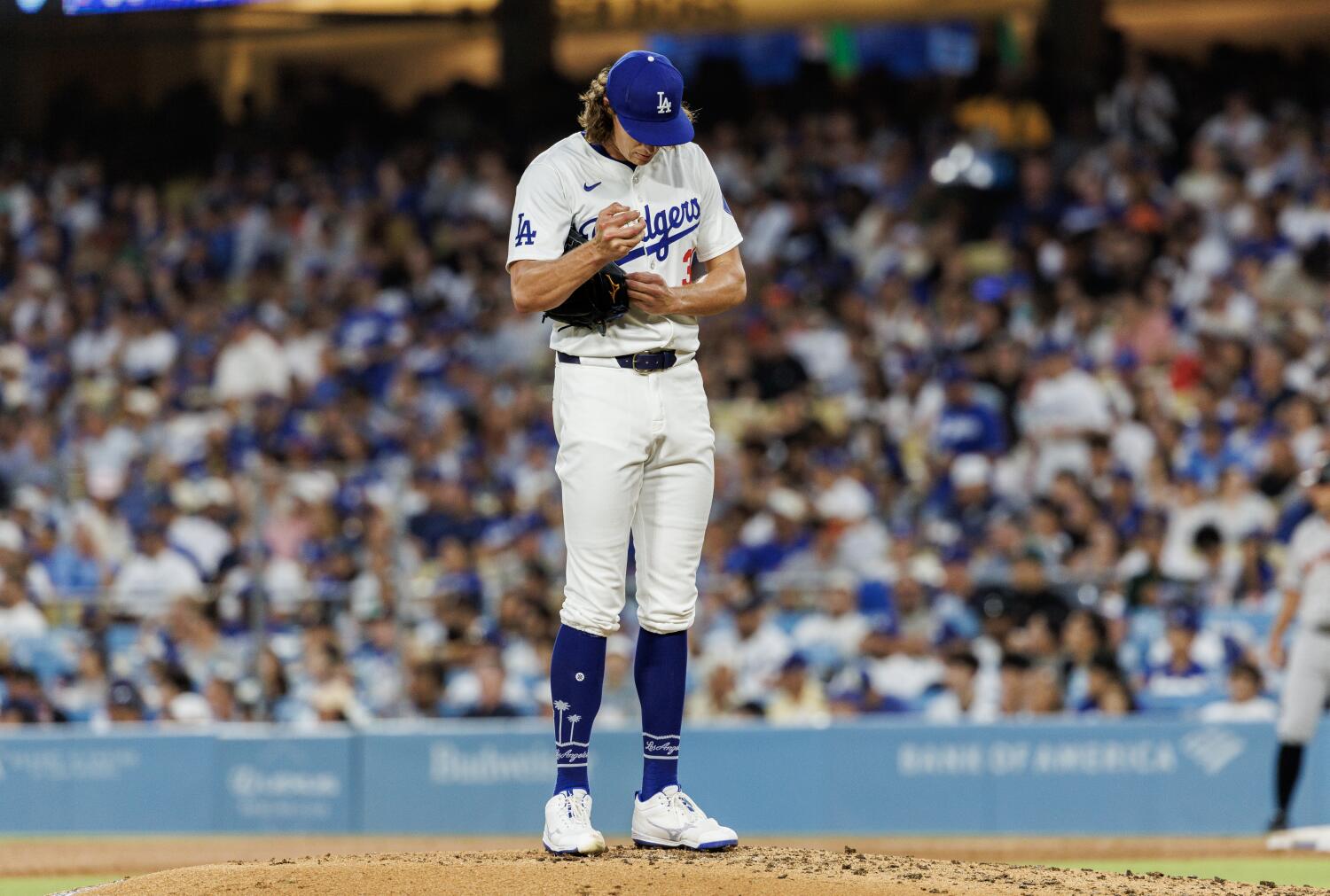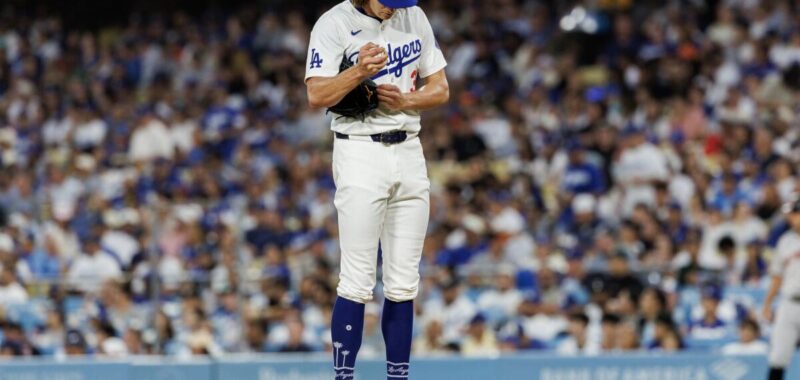
On three occasions Wednesday afternoon, Dave Roberts uttered the same phrase while discussing the shorthanded state of the Dodgers’ injury-plagued pitching staff.
“Not ideal,” the manager said.
And with October on the horizon, time is running short for the situation to improve.
With a sweep of the Seattle Mariners this week, the Dodgers did maintain the best record in the majors at 76-52. They also moved four games clear of the San Diego Padres and Arizona Diamondbacks in the National League West standings, their biggest division lead in more than two weeks.
Those marks, however, belie the tenuous state of what remains a patchwork starting rotation. They do little to answer the questions awaiting the Dodgers’ still uncertain potential pitching plans come the playoffs.
As things currently stand, it’s anyone’s guess what the Dodgers’ rotation might look like a month from now.
Roberts, who was peppered with pitching questions before Wednesday’s game, was no exception.
“Short answer,” Roberts said when asked if the Dodgers are still facing “too many” variables on the mound long-term, “yes.”
At the moment, the two primary linchpins are Tyler Glasnow and Yoshinobu Yamamoto — the almost half-billion-dollar duo the Dodgers acquired this winter hoping to avoid this exact fate.
Glasnow and Yamamoto have been good when healthy, but both are currently on the injured list and not expected to return until next month.
On Wednesday, Yamamoto threw his second simulated game since a June shoulder injury, pitching two innings at Dodger Stadium in what Roberts described as a “big step” for the rookie Japanese right-hander.
“I think at this point,” Yamamoto said through his interpreter, “everything’s starting to get all together.”
Still, the 25-year-old has several boxes to check before returning, including another three-inning sim game next week, then a minor-league rehab stint that could last another week or two.
That puts Yamamoto — who was 6-2 with a 2.92 ERA before suffering a strained rotator cuff — on track for a mid-September return.
Does that leave enough time for him to ramp up before the playoffs?
“It’s obviously not ideal,” Roberts said. “But I still think getting him back to health and building him up is [what will give us] our best ball club. So we’re going to make the most of it.”
Glasnow could find himself in an unexpectedly similar spot.
After going on the injured list with elbow tendinitis last weekend, the right-hander had still yet to resume throwing as of Wednesday. Because of that, Roberts acknowledged Glasnow’s return will likely stretch “beyond” the 15-day timeline in which he was initially expected back.
Roberts downplayed any growing concern about Glasnow’s long-term status.
“I know he’s probably frustrated,” the manager said. “But you’ve got to listen to your body.”
Nonetheless, the longer it takes Glasnow to return, the more his situation will start to mirror Yamamoto’s — leaving potentially little time for him to rejoin the rotation and ramp back up before the playoffs.
“He was fighting to stay off the IL and wants to be there for his teammates,” Roberts said, searching for optimism. “But I think with the build-up that he’s had, [missing] a couple weeks isn’t going to cut too much into what he’s already been built up to do.”
The Dodgers can only hope so.
Beyond Glasnow and Yamamoto, the team’s other pitching options represent more of a mixed bag.
While top deadline acquisition Jack Flaherty has been solid in his first four Dodgers starts — he’s gone 3-0 with a 3.22 ERA and 29 strikeouts — he has only completed six innings in one of those outings, and bemoaned inconsistent command Wednesday night that drove up his pitch count.
“I feel like I came over in a good spot, and then kind of hit probably the weirdest funk I’ve been in all year, in terms of just like nibbling, not quite getting deep enough in games, just not quite being as sharp,” Flaherty said, after a 5 ⅔ innings start against the Mariners.
“I’ve still been able to get guys out, still make pitches, which is good. But if you execute [better], you end up getting deeper into games. So it’s really close. It’s just a matter of continuing to work and turning starts like tonight into seven innings.”
The team’s next best fall-back options are Gavin Stone and Clayton Kershaw.
Stone, a right-hander rookie who was an All-Star candidate early this year, has started to bounce back from his midseason malaise, but still has an ERA over 5.00 since the start of July.
Kershaw, meanwhile, continues to defy his 36-year-old age, having given up just two total runs in three starts this month. However, after undergoing shoulder surgery in the offseason, his diminished stuff has often looked reminiscent to the end of last year, when he managed to navigate the regular season before getting shelled by the Diamondbacks in the playoffs.
Ideally, the Dodgers would likely prefer a Glasnow-Yamamoto-Flaherty playoff rotation, with Kershaw and/or Stone providing extra starting depth in a longer series.
If the Dodgers suffer any more injury setbacks among that group, though, their only other alternatives might be Walker Buehler or Bobby Miller — neither of whom have looked sharp this year returning from their own injuries.
That’s why, even with October a little more than a month away, Roberts continued to express caution about postseason pitching plans; crossing his fingers the last month of the season will produce better injury luck than most of this campaign has so far.
“We’re sort of going through it right now,” Roberts said. “I guess if the ship is righted, then I’d rather it be right now, and get the guys that we know have been good to pitch well. But not ideal is probably fair.”

